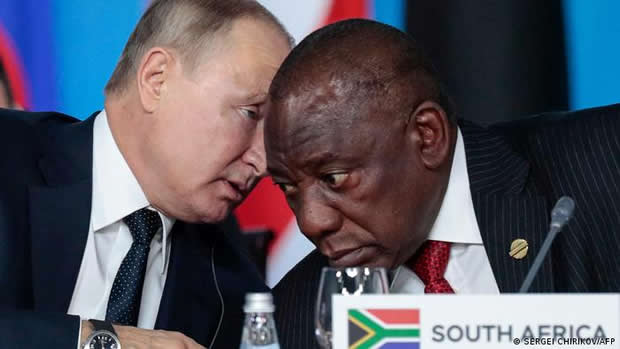
South Africa President Cyril Ramaphosa says he has been asked to help mediate peace between Russia and Ukraine, after having spoken to his counterpart Vladimir Putin. But some analysts are questioning whether South Africa’s ties to Russia could impact its neutrality.
The prospective role of mediator comes after the country abstained from a United Nations vote to reprimand Russia over its invasion of neighboring Ukraine.
Bheki Mngomezulu, a professor of political science at the University of the Western Cape, said the request shouldn’t come as a surprise.
“It’s a very tricky situation, because South Africa, by the way, has ties with both countries,” Mngomezulu said. “But in principle, I think that South Africa did the right thing on this Russian-Ukrainian issue by not siding with either side. South Africa is being looked at as a country that does not believe the use of force, but believes in negotiation.”
The presidency did not specify whether it was Russia or another party that made the request. This lack of clarity is just one instance contributing to questions about South Africa’s neutrality.
The country has also flip-flopped on its position on the conflict.
South Africa’s international relations department issued a statement last month calling on Russia to withdraw its forces from Ukraine. Since then, the call has been removed from official statements, and Ramaphosa has taken a softer stance.
“Putin was very happy that he had what Putin regards as an even-handed, balanced approach to the situation,” said Piers Pigou, a senior consultant on Southern Africa for the International Crisis Group. “That’s certainly not the perspective from many other people. It’s inexplicable for some people why South Africa cannot take a firmer stance on calling for cease-fire.”
South Africa does have a reputation for conflict mediation.
That stems from the peaceful transition out of its own racist apartheid regime to supporting other African nations in conflict, like Sudan.
But the ruling African National Congress party that led those negotiations also has decades-old ties to Russia.
“The ANC historical ties to the old Soviet Union and currently, Russia, may pose questions for the Ukrainians as to whether South African leader, like Ramaphosa, could be regarded as an honest broker,” said Charles Nupen, an attorney and executive chairman of the consulting firm StratAlign. “But I’ve got no doubt that if he were acceptable to all parties, he’s certainly got the skillset, and the right approach and experience to lead a mediation delegation.”
However, Pigou is not as certain of South Africa’s current expertise.
“I think that there is a tendency to kind of try and live off the legacy of a post-apartheid South Africa that was birthed in negotiations. The question, though, remains whether South Africa really has the competencies and capacities to deliver on mediation,” Pigou said.
Regardless of who mediates negotiations, Nupen said there remain other questions on how it will play out.
“Under whose auspices would this mediation take place? Where would it be held? How would the table be set? And, you know, what would the mediation agenda be?” he asked.
Nupen said he imagines the first priority would be to get a cease-fire in place.
Source: voanews.com























